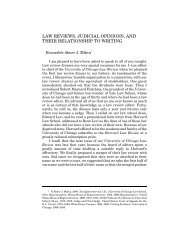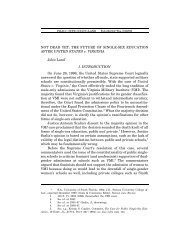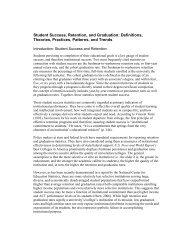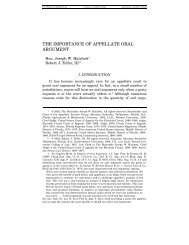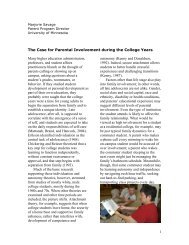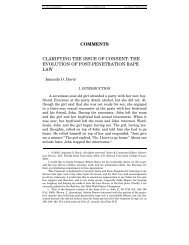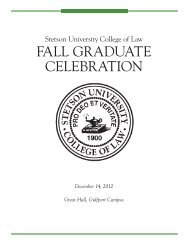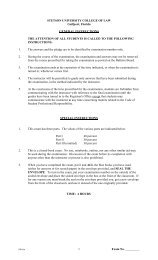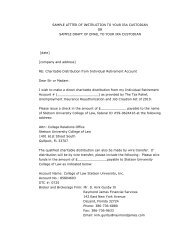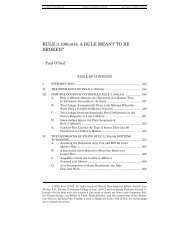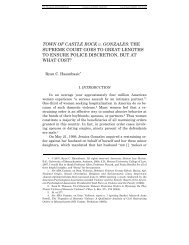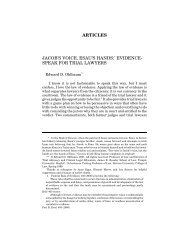Lawyer - Stetson University College of Law
Lawyer - Stetson University College of Law
Lawyer - Stetson University College of Law
Create successful ePaper yourself
Turn your PDF publications into a flip-book with our unique Google optimized e-Paper software.
F a c u l t y V i e w p o i n t<br />
Globalization and<br />
human trafficking<br />
Photo credit: Kay Chernush/U.S. State Department<br />
Faculty Viewpoint<br />
by Pr<strong>of</strong>essor Luz Estella Nagle<br />
The breakdown <strong>of</strong> trade barriers and the emergence<br />
<strong>of</strong> new regional and global markets has created a huge<br />
demand for cheap or free labor, as well as potential for sexual exploitation.<br />
Human trafficking to feed these demands has grown to epidemic<br />
proportions worldwide. We think that the stories <strong>of</strong> child slavery and<br />
sexual servitude do not happen in our backyard. But the truth is that these<br />
practices are going on right under our noses, in our affluent neighborhoods,<br />
in the restaurants and hotels we patronize, and in the sex industry that<br />
services a clientele with an appetite for the exotic and the perverse.<br />
Unlike human smuggling, in which an individual participates in the<br />
conspiracy to cross an international frontier for economic reasons, human<br />
trafficking is a crime in which the transported individual is a victim who<br />
either does not consent to be transported, or initial consent is irrelevant<br />
due to the use <strong>of</strong> coercion, force or misrepresentation and who is nothing<br />
more than a commodity. The victim <strong>of</strong> human trafficking is little more than<br />
a commodity destined for forms <strong>of</strong> exploitation beyond his or her control.<br />
The demand for free labor in global markets accounts in large<br />
measure for the International Labor Organization (ILO) estimates that at<br />
least 2.45 million trafficking victims are currently working in exploitative<br />
conditions worldwide; this number includes 1.2 million children<br />
between the ages <strong>of</strong> 5 and 14 working in highly hazardous and abusive<br />
surroundings.<br />
One <strong>of</strong> the world’s most popular products that depends on trafficked<br />
labor is cocoa. In 2005, the chocolate industry in the United States<br />
generates more than $1.4 billion <strong>of</strong> cocoa and cocoa products. West African<br />
cocoa farms that supply most <strong>of</strong> the world’s cocoa depend on trafficked<br />
children, who are forced to work and live in subhuman conditions. The<br />
major chocolate corporations, predominantly United States-based, have had<br />
many opportunities to force cocoa producers to end forced labor practices,<br />
but the demand by stock holders and investors for high pr<strong>of</strong>its dictates the<br />
continuation <strong>of</strong> modern-day slavery.<br />
Last May, I had the opportunity to travel to Lagos, Nigeria, to speak<br />
about globalization and human trafficking at the Human Development<br />
Initiatives annual conference. HDI is a Nigerian non-government<br />
organization dedicated to empowering women and children to overcome<br />
the conditions <strong>of</strong> poverty and exploitation that are endemic to the<br />
developing world. Founded by an amazing attorney and law pr<strong>of</strong>essor,<br />
Dr. Bolaji Owasanoye, HDI has undertaken the difficult task <strong>of</strong> rescuing<br />
trafficked women and children from forced labor and sexual servitude, and<br />
reintegrating them back into society.<br />
The several days I spent with Bolaji and his organization included<br />
the opportunity to visit young women rescued from servitude. Most <strong>of</strong><br />
them were HIV-positive, and the youngest victims were only 12 years old!<br />
I also met government prosecutors who are dedicated to fighting human<br />
trafficking. But from the Spartan conditions in which they work and the lack<br />
<strong>of</strong> resources at their disposal, it is obvious that despite their commitment,<br />
they are overwhelmed by the enormity <strong>of</strong> the problem, by the lack <strong>of</strong><br />
government support and leadership, and by the apathy <strong>of</strong> the corporate<br />
entities that could do something, but don’t.<br />
I also visited a primary school for girls and was literally mobbed<br />
by dozens <strong>of</strong> children, all <strong>of</strong> them motivated by a hunger for learning<br />
and a passionate desire to make something <strong>of</strong> their lives and to improve<br />
conditions in their country. The experience made me appreciate even more<br />
all the blessings and benefits we take for granted here in the United States,<br />
and reaffirmed my commitment to continue doing whatever I can to fight<br />
human trafficking.<br />
Luz Nagle is a pr<strong>of</strong>essor <strong>of</strong> law at <strong>Stetson</strong>. Before entering academia,<br />
Pr<strong>of</strong>essor Nagle was a judge in Colombia until assassination attempts<br />
by drug lords compelled her to leave the country. She earned two U.S.<br />
law degrees, clerked for the Virginia Supreme Court, and worked for<br />
Micros<strong>of</strong>t. She now advises the U.S. government and military on national<br />
security issues.<br />
The ideas presented in this Faculty Viewpoint section are the personal<br />
opinion <strong>of</strong> the author as an academic expert, and do not necessarily reflect<br />
the opinions <strong>of</strong> <strong>Stetson</strong> <strong>University</strong> <strong>College</strong> <strong>of</strong> <strong>Law</strong> or its leadership.<br />
S p r i n g / S u m m e r 2 0 0 8 15



